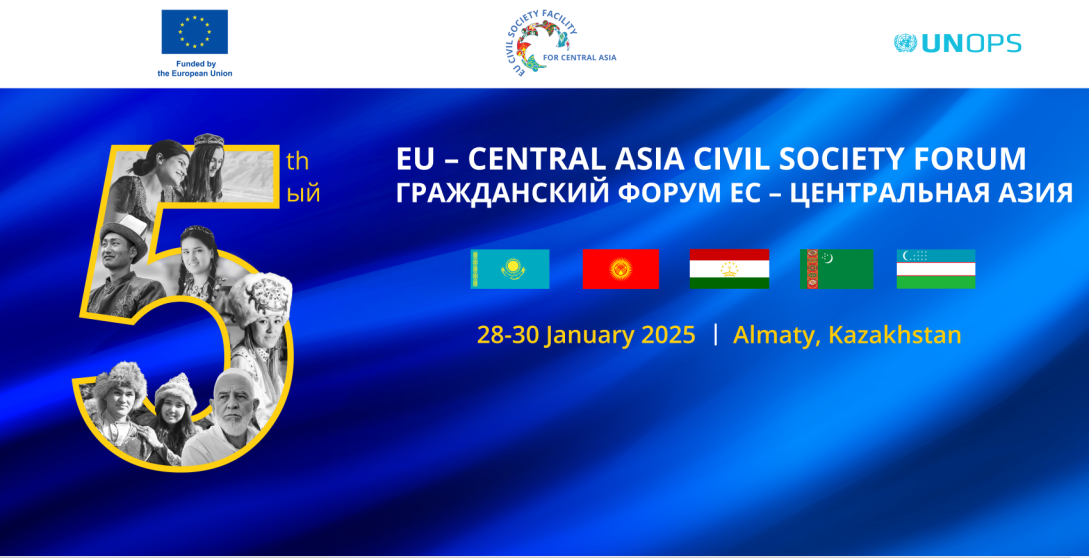Empowering Civil Society for a Prosperous Central Asia

The EU's Role in Advancing Governance and Sustainable Development in Central Asia
The European Union’s commitment to Central Asia is based on the EU Strategy on Central Asia and is implemented through Global Gateway Priorities in Central Asia. Global Gateway is the European strategy to boost smart, clean and secure links in digital, energy and transport sectors and to strengthen health, education and research systems across the world. In Central Asia, the EU seeks with its partners transformational impact in the digital, climate and energy, transport, health, and education and research sectors. The focus is on smart investments in quality infrastructure, respecting the highest social and environmental standards, in line with the EU’s interests and values: rule of law, human rights and international norms and standards
Given that resilient civil society is the foundation of democratic governance and regional stability, the EU recognizes the vital role that civil society organizations (CSOs) play in promoting transparency, advocating for human rights, and ensuring that development is inclusive and sustainable. Through initiatives like the EU Civil Society Facility for Central Asia, the EU is working to enhance the capacity of civil society across Central Asia, enabling them to more effectively participate in regional governance processes and shape development priorities.
Implemented by UNOPS, the EU Facility is focused not only on providing technical and grants management support, but also on fostering meaningful dialogue and knowledge exchanges between CSOs, international community, governments, and other stakeholders. The 5th EU-Central Asia Civil Society Forum is the primary platform for this exchange, offering a space where civil society can voice its perspectives on key challenges, propose solutions, and contribute to shaping regional policies. By aligning the Forum’s priorities with the broader EU Strategy on Central Asia, the Forum will contribute to promoting a shared vision towards themes such as digital transformation, climate change, youth participation, and women’s empowerment — all of which are crucial for the future of the region.
UNOPS: Strengthening Civil Society’s Capacity for Sustainable Development
For UNOPS, this partnership with the EU is about more than just facilitating dialogue — it’s about empowering the civil society to actively participate in the processes that will define the region’s future, ensuring the achievement of the Sustainable Development Goals to have no communities left behind.
The EU Civil Society Facility for Central Asia is aimed at strengthening the capacities of CSOs to engage in governance, regional cooperation, and sustainable development. By supporting organizations that advocate for inclusive policies, UNOPS is helping to ensure that governance is more transparent, accountable, and responsive to the needs of all communities.
The themes of the 5th EU-Central Asia Civil Society Forum - digital transformation, climate change, youth participation, and women’s empowerment - are not just relevant to the region’s development, they are globally recognized as key drivers for transformation under the UN’s Our Common Agenda to respond to current and future challenges. It is clear that Central Asia’s future hinges on the active participation of civil society in addressing key challenges.
Kazakhstan’s Commitment to Civil Society and Regional Cooperation
Kazakhstan, the host country of this year’s Forum, has long recognized civil society as an essential ally in achieving the country’s development goals in line with the country’s Listening State approach. Civil society is viewed as a key player in promoting transparency, accountability, and good governance. By supporting initiatives such as the EU-Central Asia Civil Society Forum, Kazakhstan reaffirms its commitment to regional cooperation and inclusive development.
Kazakhstan’s approach is based on the understanding that a prosperous and inclusive Central Asia can only be built through cooperation—between governments, civil society, and international partners. By strengthening the capacity of CSOs, the country is ensuring that its citizens are actively involved in shaping the future of the region. Kazakhstan’s commitment to empowering civil society is evident in its support for initiatives that foster regional cooperation, good governance and inclusive development.
A Shared Path Toward Sustainable Development and Good Governance
As Central Asia looks to the future, continued collaboration between the EU, UNOPS and other UN agencies, Kazakhstan, and the civil society will be essential in shaping the region’s development trajectory. The empowerment of civil society is not just a goal; it is a necessity. Only through the active participation of the entire society can Central Asia strengthen good governance, sustainable development, and shared prosperity. In this collective effort, the voices of the people will remain at the heart of decision-making, ensuring that the future of Central Asia is shaped by its very own communities.
Watch the messages from H.E. Ambassador of the European Union to the Republic of Kazakhstan, Mrs. Aleška Simkić and Mr. Gurel Gurkan, Director a .i. of the UNOPS Austria Multi-Country Office on this key partnership.
